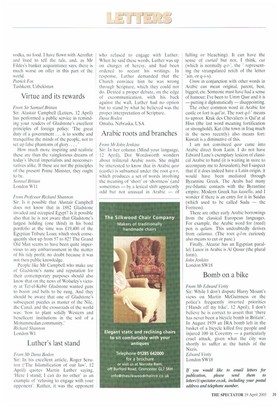Arabic roots and branches
From Mr John Jenkins Sir: In her column (Mind your language, 12 April), Dot Wordsworth wonders about triliteral Arabic roots. She might be interested to know that in Arabic qasr (castle) is subsumed under the root g-s-r, which produces a set of words involving the meaning of 'short' or 'shortness' (and sometimes — by a lexical shift apparently odd but not unusual in Arabic — of fulling or bleaching). It can have the sense of curtail but not, I think, cut (which is normally g-t-', the ' representing the strangulated retch of the letter 'am, or q-s-s).
Urnm in conjunction with other words in Arabic can mean original, parent, best, biggest, etc. Someone must have had a sense of humour; I've been to Umm Qasr and it is — putting it diplomatically — disappointing, The other common word in Arabic for castle or fort is gear. The root q-l-' means to uproot. Krak des Chevaliers is Qal'at al Hisn (the last word meaning fortification or stronghold). Kut (the town in Iraq much in the news recently) also means fort: Kuwait is a diminutive of this.
I am not convinced qasr came into Arabic direct from Latin. I do not have Edward Lane's exemplary lexicon of classical Arabic to hand (it is waiting in store to accompany me to Jerusalem), but I suspect that if it does indeed have a Latin origin, it would have been mediated through Byzantine Greek. The Arabs had many pre-Islamic contacts with the Byzantine empire. Modern Greek has kastello, and I wonder if there is an entry for it in Suidas (which used to be called Suda — the Fortress).
There are other early Arabic borrowings from the classical European languages. For example, the Arabic word for (reed) pen is galam. This undoubtedly derives from calamus. (The root q-l-m curiously also means to cut or pare.) Finally, Alcazar has an Egyptian parallel: Luxor in Arabic is Al Qusur (the plural form).
John Jenkins London SW18


































































 Previous page
Previous page